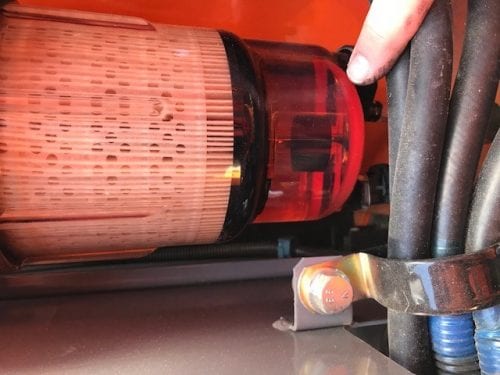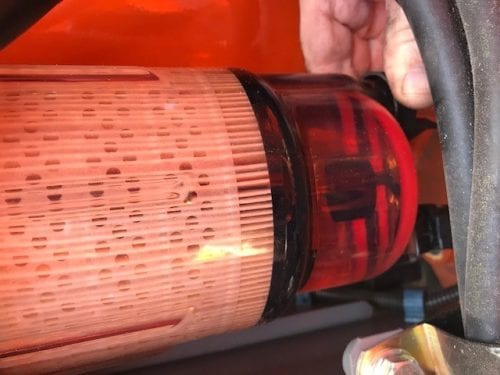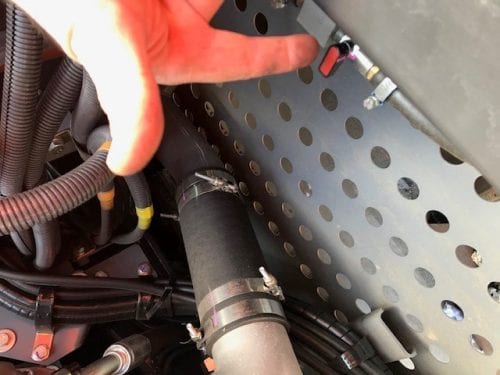![]() Added to Basket
Added to Basket
![]() Added to Basket
Added to Basket
Thursday, April 09, 2020
Good housekeeping, daily maintenance and cleanliness are key to good fuel quality and will help to avoid lost time and costly repairs.
The modern diesel engine injects its fuel at very high pressures, in excess of 20,000 psi.
The injectors and high-pressure fuel pumps both have moving parts, and, in many cases, the fuel is also the lubricant. To achieve pressures so high the tolerances between the moving parts requires a high degree of precision. Any contaminates passing through the components can result in unrepairable damage. The two biggest and most troublesome contaminates are particulates (dust, find grits) and water.
Particulate contamination
Particulates are mainly introduced into the machine whilst being refuelled. If they are present in the bulk supply or site bowser, they will be directly transferred into your tank. Every effort should be made to ensure that the bulk storage vessels are maintained and kept clean, including regular sump drains to remove accumulated water and filter changes if fitted.
The fuel filters on the machine are designed to remove particulates. However prolonged exposure to dirty fuel can increase the risk of ultra-fine particulates passing through the filters and damaging the main components. Dirty fuel will also prematurely blind the filters, which will not reach their recommended replacement interval. This will increase the cost of ownership, loss of availability and earnings.
Water contamination
Water contamination can also enter your fuel tank from the bulk storage vessels if they are not properly maintained. The presence of water in your fuel can cause several problems with the modern diesel power plant. Water in the fuel will reduce engine performance; not only can it lead to fuel system component failure, but it can also damage the exhaust after-treatment devices. Tier IIIb, IV and V are fitted with exhaust after-treatment devices. They rely on high temperatures to burn off ash which is collected within the device. Water in the fuel can affect the combustion process and the after-treatment devices cannot achieve the high temperatures and become ineffective. This can result in a controlled reduction of engine speed and the services of an engineer with a costly repair invoice to follow.
Water in the fuel also supports and encourages the growth of microbial living organisms, more commonly known as ‘diesel bug’, and is very difficult to eradicate once it has entered the fuel supply chain.
Condensation can also be a problem due to the high temperature swings in and around the machine’s fuel tank. When the machine is stopped at the end of the working day, the fuel tank cools, and this results in condensation on the inner walls of the tank. The best method to avoid this is to fill the tank at the end of the day.
Daily maintenance by the operator can help to manage the control of water contaminated fuel.
Here we see the primary filter and water trap as fitted to the mid-size excavator range. The lower transparent part of the filter is where the water accumulates. It is fitted with an indicator float that rises on top of the water. If left too long, it will trigger an alarm to notify the operator of high-water content in the trap. To minimise the risk of damages, the trap should be drained long before the alarm is triggered. This can be achieved by loosening the drain tap on the bottom of the trap and draining off the water. Take care to catch the contents in a suitable container to avoid damage to the surrounding environment.




The mid-size range of excavators are also conveniently fitted with a remote tank sump drain tap located behind the main pump door next to the filters, for ease of maintenance. Periodic draining of the tank sump will eliminate any accumulated water and is best done at the start of the day, when the tank contents have settled. Be sure to take the same environmental precautions.


The location of water trap and tank sump drain taps on all models is detailed in your operator’s manual.
Just remember, a little care and attention to detail, with the correct daily maintenance, will keep your machine in a reliable tip top condition.
IT’S ALL ABOUT THE FUEL!
Derek Humphries – National Technical Manager